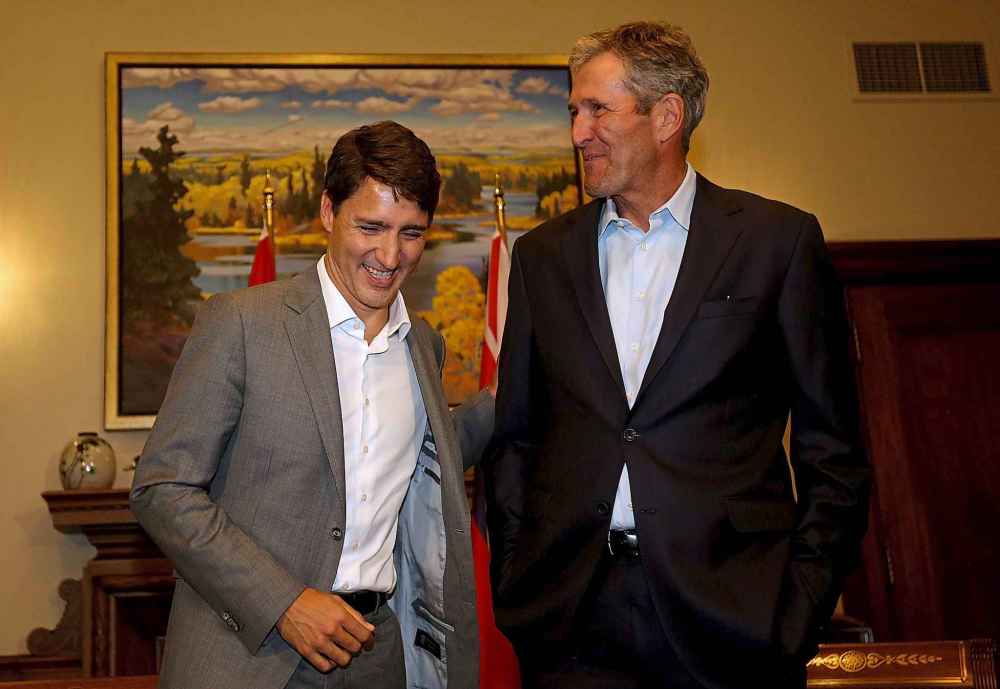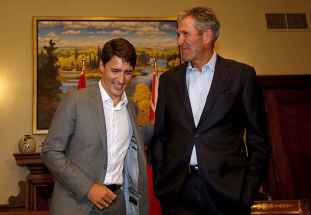Meeting with Trudeau derailed Manitoba carbon tax plan: premier
Read this article for free:
or
Already have an account? Log in here »
To continue reading, please subscribe:
Monthly Digital Subscription
$1 per week for 24 weeks*
- Enjoy unlimited reading on winnipegfreepress.com
- Read the E-Edition, our digital replica newspaper
- Access News Break, our award-winning app
- Play interactive puzzles
*Billed as $4 plus GST every four weeks. Offer only available to new and qualified returning subscribers. Cancel any time.
Read unlimited articles for free today:
or
Already have an account? Log in here »
Hey there, time traveller!
This article was published 04/10/2018 (2342 days ago), so information in it may no longer be current.
According to Premier Brian Pallister, it became apparent to him last month, after a face-to-face meeting with Prime Minister Justin Trudeau in Winnipeg, that Manitoba would have to abandon its carbon tax plan.
The province fought for close to a year to convince the federal government to accept its flat-tax proposal, arguing it would be more effective — and fairer to a province that had made massive investments in clean hydroelectric power, Pallister said.
There were face-to-face discussions, letters and phone calls — all designed to convince Ottawa to see “the wisdom of respecting our plan,” he said.

But by Sept. 11, when Trudeau and Pallister met at the premier’s office in the legislative building, it was clear Ottawa would not budge on its insistence the carbon tax would eventually rise to $50 a tonne.
“The sitdown with the prime minister a couple of weeks ago was pretty much clear,” Pallister said Thursday, a day after his surprise announcement the province was withdrawing its plan to impose a $25-a-tonne carbon tax, effective Dec. 1. “Either we’re standing up now to the federal threat or we’re standing up in a year. So which one’s better? I would say now.”
Before Wednesday, the government had given no signal it would abandon its carbon tax plan. The decision came as a surprise to business leaders and opposition politicians alike.
As late as last month, Sustainable Development Minister Rochelle Squires wrote to Progressive Conservative party members explaining why Manitoba had created its own carbon pricing plan and why it was superior to the tax regime Ottawa was ready to impose on provinces that failed to come up with their own scheme.
Under questioning from reporters, Pallister said he has no had no recent discussions on carbon levies with Ontario Premier Doug Ford nor Saskatchewan Premier Scott Moe, who are both challenging Ottawa’s carbon tax policy.
The premier said he has not yet been told how monies raised from a federally imposed carbon price next year would be funnelled back to Manitoba. (Ottawa has promised to remit taxes collected back to the provinces.)
Would the feds make a lump-sum payment to the province or issue cheques to individuals? “This is the unanswered question and the one that I have raised with the prime minister already,” the premier said.
Given their differences at their face-to-face meeting in Winnipeg, it no doubt stuck in the premier’s craw Trudeau had praised his government’s climate change policies while in Winnipeg, holding Pallister up as an example for conservative counterparts in other provinces.
Referring to the PM’s comments Thursday, the premier said: “I don’t think anybody likes to be used as a prop, and I am certainly not inclined that way.”
NDP Leader Wab Kinew and Liberal Leader Dougald Lamont decried the Pallister government’s new stance on the carbon tax.

“This was a remarkable about-face, this was a total flip-flop by the premier. I’m not sure if he was scared of Justin Trudeau. I’m not sure if he was scared of his own base. I’m not sure if he was scared of being left behind by Doug Ford,” Kinew mused. “He changed his mind, and it appears he didn’t reach out to any stakeholders based on who I’ve spoken to in the last day, and he caught his own caucus off-guard.”
Lamont urged Pallister to take responsibility for his decision to axe the proposed provincial carbon tax system, which never aligned with federal targets that aimed to rise to $50 per tonne by 2022.
TIMELINE
Oct. 27, 2017 – Province publishes climate and green plan
Premier Brian Pallister and Sustainable Development Minister Rochelle Squires unveil Manitoba’s Climate and Green Plan at a news event at Oak Hammock Marsh. It includes a carbon tax that would start — and stay — at $25 per tonne.
“We have a better plan than the plan that they’re advocating,” Pallister said of the federal government. “I don’t think they’ll win in court. But I would prefer that in the court of public opinion that we make clear to Ottawa that our better plan is the one supported by Manitobans.”
Oct. 27, 2017 – Province publishes climate and green plan
Premier Brian Pallister and Sustainable Development Minister Rochelle Squires unveil Manitoba’s Climate and Green Plan at a news event at Oak Hammock Marsh. It includes a carbon tax that would start — and stay — at $25 per tonne.
“We have a better plan than the plan that they’re advocating,” Pallister said of the federal government. “I don’t think they’ll win in court. But I would prefer that in the court of public opinion that we make clear to Ottawa that our better plan is the one supported by Manitobans.”
Dec. 18, 2017 — Squires says Manitoba’s plan is better than Ottawa’s
The Manitoba carbon tax plan will ultimately lead to greater reductions in emissions than the escalating federal levy targets will, according to Squires. “It would be very unfortunate, and frankly counterproductive, for the federal government to come in and penalize us with a price that we are not prepared to go to when we’re already committed to strong action on climate change.”
March 12 – Budget outlines carbon tax benefits
After publishing Budget 2018, then-finance minister Cameron Friesen said: “All carbon tax revenues received over four years will be returned to Manitobans through tax reductions.”
March 15 — Manitoba introduces green plan bill
Squires introduces Bill 16 (Climate and Green Plan Implementation Act) in the legislature, which includes a made-in-Manitoba carbon pricing scheme. She told reporters: “The government should be taxing things we don’t want, like pollution, and not taxing things we do want, like economic growth.”
April 5 – Feds explain plans for green tax in Manitoba
An Environment Canada spokesman said the federal government planned to collect a top-up carbon levy from Manitobans, if provincial levies fall short of Ottawa’s preferred tax plan. Again, Squires backs Manitoba’s plan.
“The focus of the carbon levy should be on outcomes,” she said. “Manitoba has done its homework in designing a carbon pricing system that strikes a careful balance.”
April 6 – Pallister tells Ottawa to “back off” on carbon tax
“I have a simple message for Ottawa today: back off or we’ll see you in court,” the premier said. “If you can’t prove your plan works better than the Manitoba plan, you have no right to invoke any higher levy on the people of Manitoba.”
July 19 – Ford tweet denied by Pallister camp
During a premiers meeting in New Brunswick, Pallister meets with his Ontario and Quebec counterparts, Doug Ford and Philippe Couillard, respectively, to discuss carbon pricing. After the meeting, Ford tweets Pallister had committed “to working together to ensure that no carbon tax is ever imposed on the people or our great provinces.” The tweet is deleted, however, when Pallister’s camp disagrees with Ford’s message.
July 26 – Polls show provincial support for carbon tax softening
David McLaughlin, the architect of Manitoba’s green plan, said internal PC party polling showed Manitobans preferred the provincial carbon tax plan to Ottawa’s version. “Pallister absolutely picked the sweet spot. There was some foresight put into it.”
July 30 – Plan for large-scale emitters
Squires lays out the province’s output-based pricing system for six large-scale emitters, which exceed 50,000 tonnes of carbon dioxide emissions per year.
“They are going to look at this as an opportunity to start to reduce their emissions profile,” she said. “Many of them have already begun the work, and we’re going to be moving hand-in-hand with them as we move forward to ensuring that they achieve their goals to (reduce) carbon emissions and pay less carbon price.”
Aug. 30 – Province rebukes carbon-related report
After the Canadian Centre for Policy Alternatives releases a report decrying Manitoba’s green plan, a government spokesperson said: “It is better to keep this money in Manitoba than to lose it in a courtroom… Manitoba’s flat, $25-per-tonne, economy-wide carbon tax and output-based pricing system for large industrial emitters is projected to reduce emissions by 80,000 tonnes more than the federal plan that starts at $10/tonne and climbs to $50/tonne by 2022.”
September – Squires sends letter in support of carbon tax to party members
In a letter sent to party members and supporters, Squires says the PCs have been hearing “a lot about the upcoming carbon tax,” including concerns from members.
“As Saskatchewan and Ontario are now doing, your PC team considered taking legal action to fight the tax. We obtained a legal opinion, which concluded that Ottawa does have the power to impose a carbon tax on provinces that do not introduce their own. In other words, Manitoba gets the Trudeau tax if we don’t have our own plan. Doing nothing is not an option,” she wrote.
Sept. 11 – Trudeau visits Winnipeg
Pallister and Prime Minister Justin Trudeau sit down to discuss various provincial-federal matters, including the carbon tax. Asked if he had convinced Trudeau to his way of thinking, the premier said: “Not at this point, but I expect that that’s something we’re going to have to continue to pursue.”
Oct. 3 – Pallister scraps plans for provincial carbon taxes
During his first address of the fall legislative sitting, Pallister announces his government will “say no” to carbon taxes imposed by Ottawa, as the federal government does “not respect Manitoba’s (climate and green) plan.” According to the premier: “Either you’re going to stand up for Manitobans in a year, when the feds come in, as they’ve threatened to do, with a higher carbon tax, or you do it now. And we’re doing it now.”
— Jessica Botelho-Urbanski
“One of the things (Pallister) does is blame everything on everyone else. I mean, look this was absolutely his choice and his decision to make. It’s not news that the federal government said this is how we’re going to replace the carbon tax,” he said.
Manitoba Chambers of Commerce president Chuck Davidson said his organization was not opposed, in principle, to a carbon tax, but it worried about its effect on business competitiveness. “There was a concern that we were putting ourselves on a bit of an island,” he said of the Manitoba flat-tax proposal.
While businesses may be now breathing a sigh of relief they won’t have to begin paying the tax Dec. 1, Davidson said, “The question is: where to we go from here?”
larry.kusch@freepress.mb.ca
jessica.botelho@freepress.mb.ca

Larry Kusch
Legislature reporter
Larry Kusch didn’t know what he wanted to do with his life until he attended a high school newspaper editor’s workshop in Regina in the summer of 1969 and listened to a university student speak glowingly about the journalism program at Carleton University in Ottawa.
Our newsroom depends on a growing audience of readers to power our journalism. If you are not a paid reader, please consider becoming a subscriber.
Our newsroom depends on its audience of readers to power our journalism. Thank you for your support.











